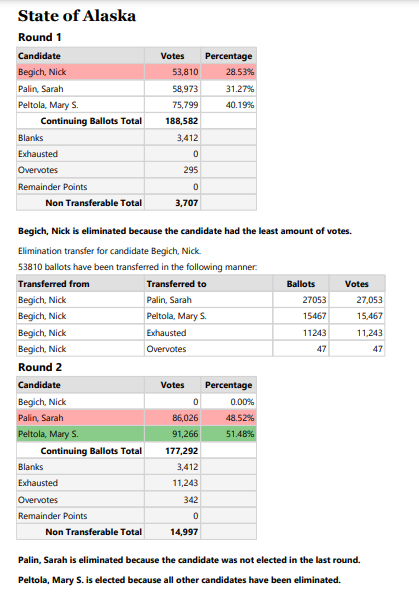@rob said in New method (I think?): Hare-squared:
@rb-j said in New method (I think?): Hare-squared:
As far as I understand, this is expressed with the maxim "One person, one vote".
Yeah that is a very vague saying. I get the concept, but many people interpret it very literally, such as saying that ranking or approving doesn't qualify simply because they are doing more than checking a single box.
I understand that, and it's essentially where we RCV advocates disagree with detractors who insist on FPTP.
What they don't want to understand is the notion of the Single-Transferable Vote. It's one vote, but it gets shifted around in such a manner that best benefits the political interest of the enfranchised person who is voting. They get only one vote.
The difference between the Hare advocates and the Condorcet folks are that the former says that some of us cannot transfer our vote from our higher-ranked candidate, that was just eliminated, to the contingency candidate of our choosing as expressed on our ballots. The Condorcet advocates say we can. When you promote your product saying *"You can vote for the candidate you really want and need not choose between the lesser of evils. If your favorite candidate cannot win election, then your vote counts for your second choice." Howard Dean (whom I was fortunate enough to introduce to a big crowd in NH in 2004) made that claim ignorant of the fact that it's demonstrated false in the experience of his very own home town.
When you make that claim (which is Property 4 in this), you should mean it.
In order to allow voters to vote their hopes instead of their fears, the election should not punish (or disincentivize) voters from voting their hopes. It does that by actually preventing the spoiler effect (an oft advertized feature of RCV). And it does that by making sure that the majority candidate is elected and not blocked from election because of the spoiler.
I've used the example of people voting for a number (say an office temperature or the amount of monthly dues) and choosing the median, which is as close to everyone having "equal voting power" as anything I can imagine.
The median helps block the effect of exaggeration of one's preference in order to unfairly increase the effect of one's expression of their preference.
But so does One-person-one-vote. Unlike Score Voting or Borda RCV, it doesn't matter if I prefer A enthusiastically and you prefer B only tepidly, your vote for B should count just as much as my vote for A.
The median thing is a mathematical tool to prevent outliers from changing the measure of how the middle of the spectrum affects a composite measured property (like median income vs. mean) or in social choice.
I tend to think Condorcet systems most closely approach that in elections with human candidates and a single winner.
And that cannot be satisfied outside of Majority Rule: If a simple majority of voters agree that Candidate A is a better choice for office than Candidate B, then Candidate B is not elected.
I've never been big on the use of the word "majority" when there are more than two candidates. Especially if combined with the word "support", which seems so artificially binary.
Between two candidates there is an unambiguous notion of majority support if we agree that every voter's expression of support (that's what a vote is) is counted equally.
The fact that there always exists a simple majority between two candidates (unless they tie) is misconstrued by naive (or disingenuous) RCV advocates to claim that RCV is "guaranteed to elect the majority-supported candidate" because it boils the election down to two candidates in the final round, in which there is always a simple majority.
Of course that Hare final-round pair of candidates is not the only way to pair two candidates and examine which one is supported more than the other. Everyone, other than the Condorcet loser, is a "majority candidate".
If I vote for someone over another person, that is no indication that I "like" them in any everyday sense of the word, only that I prefer them over someone else.
That's correct. And that preference of yours counts just as much as my preference for the "someone else". Doesn't matter how much more I prefer my candidate vs. how much you prefer yours. Our votes should count equally.
I agree that Condorcet is best (it seems to meet my idea of "game theoretically stable," which is important to me but not necessarily a priority for others), but I just don't like using the concept of "majority."
Simple majority and Absolute majority have dictionary definitions that are reasonably concise.
And again, I refer back to the "voting for a number" thing.... my vote might pull the vote from 69.2 degrees to 69.3 degrees, when I preferred 72 degrees.
And a good and fair social choice system should not incentize you from expressing your preference in any manner other than sincere. Express your sincere preference and rely on the method to respect your preference, as a person holding equal rights and equal franchise, equally as much as any other person's preference.
That can be perfectly fair and equitable, but the word "majority" doesn't in any way apply.
That's right. And if we were voting for an alternative that is an ordered quantity, Score Voting using median score rather than plurality score, seems very fair and equitable to me. Maybe use this for a public vote on the city's budget cap or tax-base percentile. But not people or maps or discrete alternative plans that are not an ordered quantity. Then the only fair thing is valuing each voter's vote equally.
